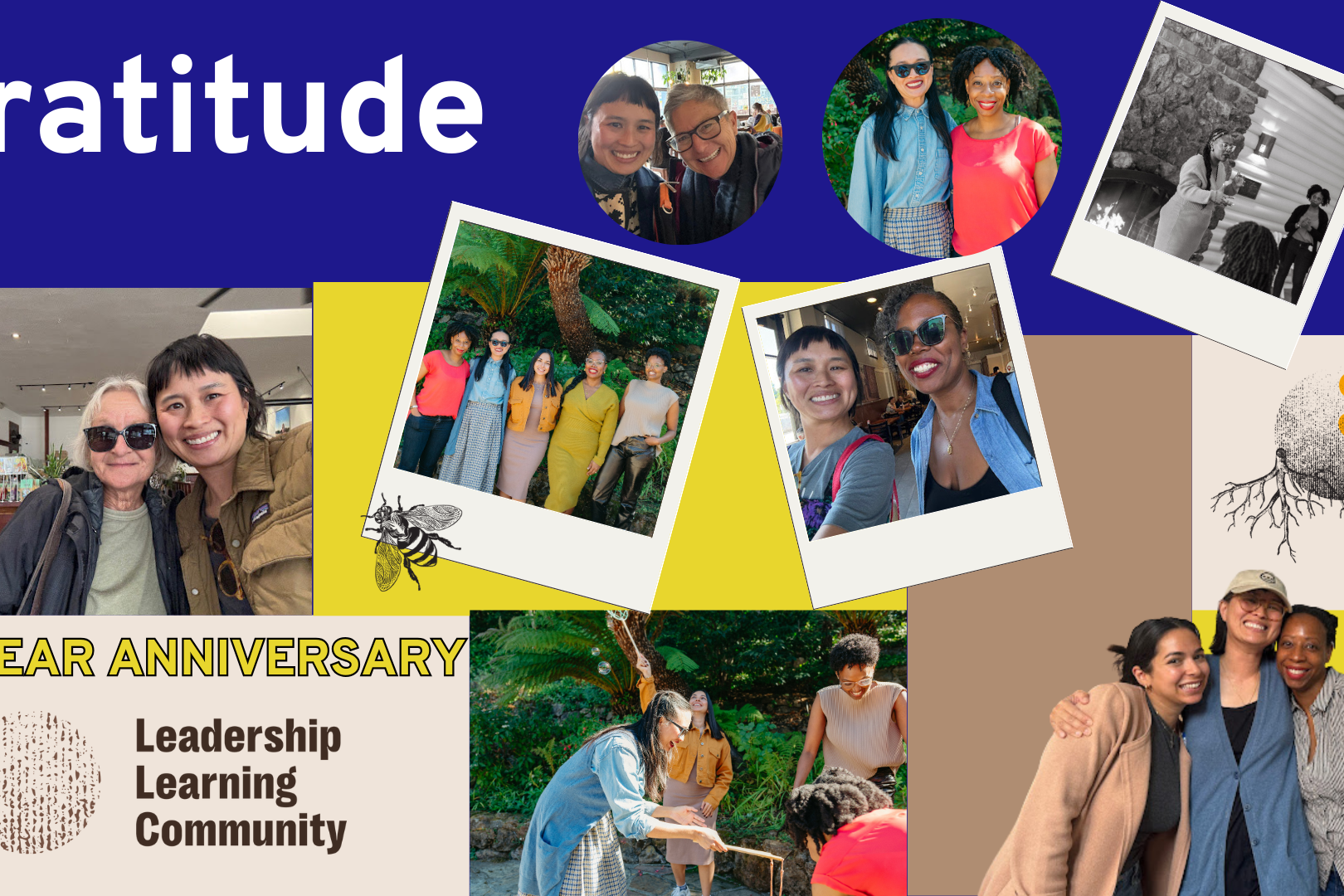Ericka and I have been co-executive directors together since January 2022. I have so much gratitude for this period of my life that has all to do with getting to know her better and learning from her leadership. She is a generous, brilliant, and thoughtful leader. Our advisory board has described her as a “courageous and grace giving leader – not with hubris, but with humility.” In short, Ericka is a true believer in us – the community of social good leaders who are trying our best to find ways forward towards an equitable, just, and joyful world.
Ericka’s accomplishments at LLC are vast, and I wanted to name a few highlights including:
- Building out the shared leadership and distributed leadership model at LLC
- Founding member of Liberatory Leadership Partnership
- Leading LLC’s practice and work on Liberatory Leadership
- Making the decision to enact a Fiscal Sponsorship Transfer to PossibilityLabs
- Co-leading LLC’s liberatory transitions work
- Developing a loosely facilitated coffee chat approach that we use for our BIPOC Affinity Space and ED Learning Circles
- Co-authoring Leadership and Race: A Call to Each Other Report
- Co-authoring the Liberatory Leadership Framework
Though LLC is well prepared for the strategy and logistics in transitions, we know transitions are also emotional. We have no choice, but to feel all the feelings. Grief, unsettledness, messy sadness, gladness, joy, gratitude, love, and whacky creativity have been in rotation here. And in very Ericka fashion, she continues to lead us by articulating her perspective and learnings on her transition through her final blog as Co-Executive Director of Leadership Learning Community – Umami Sweet: Reflecting On My Transition.
Nikki Dinh
A Grateful Co-Executive Director

Photo credit to Amira Maxwell
As we shared last month, my time as the Leadership Learning Community’s Co-Executive Director is coming to an end. The 6 years I’ve spent at LLC represent some of the best years of my career. LLC is extraordinary; if you’ve ever been in an LLC space, you know that it is beautiful, productive, and inspiring. Yes, this is a challenging moment for all of our organizations. And, at LLC, we’ve made hard choices and as a result, LLC is stable, strong, and most importantly, we remain true to ourselves, our work, our “vibe,” and our values. I’m excited about and confident in LLC’s future. I’m proud of the work we were able to do during my tenure at LLC, and I’m proud in advance of the work LLC will continue to do after my tenure. At LLC, we have worked hard to shore up our organization, and we’re constantly keeping our house in order. This intense and frequently invisible work gives us the ability to surf these scary times without sacrificing our commitments, our loves, our softness, our risk-taking, and our experimentation. In keeping with our learning stance, LLC is using my transition as a way to learn and adapt. The team will be taking this as a moment to explore what the best structure for LLC might be given the realities of the current funding environment, which is both uncertain and unfriendly to justice work.
Fortunately, my transition to the Robert Sterling Clark Foundation will allow me to stay in close relationship with LLC. I’ll also get to do work that excites me, with people that I like. During this period of change, I feel both a tingly anticipation as I set out on a fun new path and a deep sense of grief as I turn the page on my time at LLC. In talking with my coach Belma, I tried to articulate the feeling of leaving, and we found that the word “bittersweet” didn’t seem to express my feelings. Belma jokingly offered “umami sweet” and I latched onto it because it captured the depth and complexity of the feelings I’m currently holding. It feels weird to grieve when my next step is so good, but I challenge anyone to leave this team and not miss the smart, brave, caring, loyal, and thoughtful people who make up the LLC staff and community. Try it! I double dog dare you!
At LLC, I have had the opportunity to learn and grow. I was able to both grow myself and grow into myself. I was supported by so many people in that growth. The LLC Advisory Board, LLC’s Founder and my first Co-ED Partner, Deborah Meehan, my LLC staff teammates, our coach Belma Gonzalez, and LLC’s partners in the field. I have been deeply nourished in my leadership growth by my current Co-ED Partner, Nikki Dinh. I don’t have words to describe how she has supported me to find my voice, name my truth(s), and become the leader I am today.
LLC has prospered because of our distributed leadership approach. I hope my absence further reveals how leaderful LLC is, illuminating the contributions of the full team. As I prepare to leave, I have no worries about LLC’s future. Zip, Zero, Nada! I have only the wish to have a small role in that future, to remain in LLC’s constellation, this time as a friend rather than as a team member.
Stay connected to LLC: Sign up for the newsletters and check out the recaps of our recent virtual series, The Leadership Cosmos: 25 Years of Expanding Possibilities (here, here & here).
With love,
Ericka Stallings
10 +1 Learnings From The Middle Of An Umami Sweet Transition
LLC has frequently been gifted with the opportunity to hold organizations through transitions, often using wisdom from our own experiences. It’s been interesting, exciting, and challenging to continue practicing what we preach this time around with my transition. At this point in the process, I’m feeling the urge to toot our own horn and share what’s worked well for us (and maybe offer a reflection or two on what could have gone better). LLC has lots of wisdom related to leadership transitions. The following reflections feel most resonant for this stage of LLC’s process.
1. Socialize the idea of transition as early as is reasonable and possible.
Socializing the idea of transition doesn’t necessarily mean making an announcement. Talking about leadership change can demystify and destigmatize the idea, blunting but not necessarily eliminating the shock people may feel (elimination may not be possible).
- At LLC, I raised the idea of leaving long before thinking about or planning for my exit. However, I didn’t do so very intentionally. Later, when my exit became real, at LLC, we talked about the transition with the team many months before announcing publicly. In retrospect, if I had this to do all over again. I would have more intentionally socialized the possibility of transition, discussing the possible concerns, impacts, and opportunities.
- Perhaps because of LLC’s transition-related work, there is a general team awareness and language for transitions and change. Additionally, LLC’s learning stance and openness to experimentation primed people for change. You may need to account for this in your own transition conversations.
2. Be transparent about the landscape or conditions that influence the decision.
We shared external context, internal and external conditions that impact the decision so the team would have a full picture and complete understanding.
3. Do a detailed risk analysis.
- We used this time as an opening to explore leadership transitions possibilities more broadly. We identified some common types of transitions (e.g., emergency, planned, multi-staff, founder, etc.)
- We fleshed out the different scenarios and the perceived related risks, and articulated the fears we had and the opportunities we could imagine.
- Risk: Identify the level of each identified risk (High, Medium, Low).
- Use this as an invitation to dream and imagine fantastic possibilities.
- We documented ALL of the possible risk mitigation options we could imagine: resources, capacities, connections, assets, and structures. These included preexisting and/or otherwise accessible options for us. It’s good to include some things that feel like long shots, so long as your planning feels realistic overall.
4. Hold staff conversation, reflection, and visioning time.
- LLC Advisory Board member, Jennifer Lopez, facilitated a conversation that helped us articulate our purpose and later ground the transition process in our mission and values.
- LLC engaged Bess Bendet to hold staff conversations to surface the impact of transition, needs, and feelings. This process has kept surprises at bay and helped us be proactive and intentional in our approach.
5. Ask for concrete help: You probably can’t hold yourself as you hold others.
- Coaching- We have been supported by Belma Gonzalez with both individual and team coaching. We also think highly of coaches from Coaching for Healing Justice and Liberation.
- External Facilitators: As described above, LLC asked friends and allies to facilitate important conversations so we could be fully present and not have to facilitate ourselves.
- Funders: Inquire about transition support funds, funders, and related resources.
- Friends: Reach out to friends with specific asks, such as “Help me figure xyz out” or “I’m feeling stuck here____”
- Engage lawyers & HR professionals, as needed.
6. Name your values and intentions.
We explicitly name the values we want to be present or centered during the transition process. E.g., write them down and insert them in policy or procedure documents. This has allowed the team to stay aligned.
7. Talk to someone.
Find and cultivate community, practice solidarity. There is no need to do this alone. Organizations often treat transitions as a dirty secret, hiding what is happening out of the very reasonable fear of reputational harm with funders and allies. Transitions are inevitable, so try identifying smart and strategic ways to connect with people you trust.
- LLC is working hard to constantly get our fears, frustrations, and hopes out of our heads by expressing, not suppressing, the mythical “bad feelings.” I don’t think there are any bad feelings, just feelings.
- Perhaps you aren’t alone. Talking openly gave LLC the opportunity to collaborate with peers who are similarly situated.
8. Clarify your messaging.
Clear and consistent messaging can help to build trust and security. It also allows you to exert some control over the narrative. It is important to note that communication regarding transitions is highly time-consuming for the outgoing ED and requires managing one’s own emotions and the emotions of those receiving the news.
- We got clear about what we wanted people to know about my exit and how we wanted to position LLC.
- We got clear on our audience: Staff, peers, board, funders, other stakeholders.
9. Pay attention to feelings.
Make sure to create space to surface and process feelings. We often feel like our feelings are inappropriate in the workplace. We may not process all feelings in the workplace, but it is important that the feelings that will impact the workplace are dealt with somewhere (e.g., in a coaching session). If they aren’t dealt with intentionally, they are more likely to emerge at an inopportune time. Given the importance of feelings, leaders should be mindful of the emotional labor that transitions often entail. This labor is often not visible and therefore can be easy to underestimate when workplanning the transition. Consequently, we encourage you to add a bit of buffer time.
- We help each other manage our feelings (but do not take responsibility for them). Individually, everyone must take responsibility for their own feelings and desires.
- The variety, intensity, and waves of feelings can be surprising.
- We have grace for ourselves and others. Mistakes have been made and more are likely to come.
- Helpful reflections prompts we use are: Regarding the transition, how are things feeling, what’s working, and what’s asking for attention?
10. Distribute Leadership & Power
- As the outgoing leader, this has meant leaning into deferring. This has required me to drop even more ego, and it has actually been freeing. For me, this is part of letting go and trusting the team and the organization.
- I’ve tried to identify and minimize choke points and bottlenecks, places where I might get in the way of forward motion. These are the “only I can do it” points.
- We have minimized the risk of this by intentionally building the capacity of the team, instituting the appropriate structures, and nurturing trust. We didn’t wait until the end to dump responsibility on the team without setting them up for success.
- We have made every effort to communicate roles, responsibilities, power, and clarify the decision-making process.
Plus 1: Complete the LLC Transition Worksheets– We used them and they really helped!

Related Posts
December 15, 2025
LLC’s 2025 Celebrations
July 21, 2025




